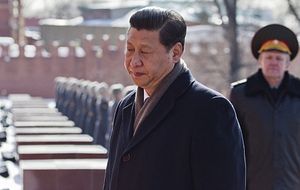Last November, during the Third Plenum, China announced the formation of a new national security commission, to be chaired by President Xi Jinping. At the time, analysts wondered what the focus of the new commission would be—would it be externally focused, or more concerned with China’s internal stability?
Writing for The Diplomat, Wen-Ti Sung hypothesized that the new national security body would be primarily focused on domestic security. Even without the new commission, Xi Jinping already had control over foreign affairs, but much less so over China’s “stability maintenance” forces. However, the commission was also believed to be a way to streamline decision-making with regards to the military, meaning a focus on traditional national security issues as well.
The national security commission held its first meeting on Tuesday, finally giving some hints as to the purpose and function of the new organ. Chinese state media outlet Xinhua gave prominent coverage to the meeting, with headlines on both its English and Chinese webpages.
In a speech at the meeting, Xi underlined the importance of national security in the classical sense: a strong military able to defend the country. Xi noted the connection between national security and economic development: “Development is the foundation for security, and security is a condition for development. Only a prosperous country can have a strong military, and only a strong military can protect the country.”
Still, Xi also made it clear that he continues to subscribe to the theory of peace through strength. According to this line of thinking, en vogue at this spring’s National People’s Congress, China’s robust military will ensure peace by deterring conflict. “Externally, the country will seek peace, cooperation, a win-win situation and a harmonious world,” Xi said when defining China’s national security goals.
It was also clear that domestic security (as predicted) would play a major role in the new national security commission. Xi said that to ensure national security, China must pay attention to both external and internal security. “Domestically, China will pursue development, reform, stability and foster a safe environment,” Xi said. The new commission will function then, not only to protect China as a whole from external threats, but to protect the Party specifically from both internal and external forces. Xi said in his speech that national security was a matter of foremost importance in order for “our Party to consolidate its ruling status, and to rally and lead the people to hold fast to and develop socialism with Chinese characteristics.”
This combination of domestic stability and external security might have been what Xi meant when he called for China to follow a “national security path with Chinese characteristics.” In his speech, both internal and external security seemed to be assigned roughly equal weight. Xi’s comments made it clear that China’s domestic “stability maintenance” falls under the purview of national security—thus allowing the commission to take the lead over China’s massive domestic security apparatus.
Further underlining the commission’s expanded powers, Xi used the word “unified” and “efficient” several times to describe the new national security commission. While there are still few details on how the commission will interact with existing bodies (including the State Council and the Central Military Commission), Xi’s speech made it clear that he envisions the commission as the guiding force in national security decisions.
Xi told the other commission members that China’s internal and external national security concerns “are more complex than at any time in history.” Accordingly, Xi provided a laundry list of areas the commission will need to address: “political security, homeland security, military security, economic security, cultural security, societal security, scientific and technologic security, information security, ecological security, natural resource security, [and] nuclear security.” This long list of items would give the new commission virtually carte blanche to handle any issue it sees fit.
Ultimately, China’s national security policies (both external and domestic) are unlikely to change due to the new commission. Instead, the biggest change might be the further consolidation of power directly in the hands of Xi Jinping and other Politburo Standing Committee members, most notably Li Keqiang and Zhang Dejiang.

































